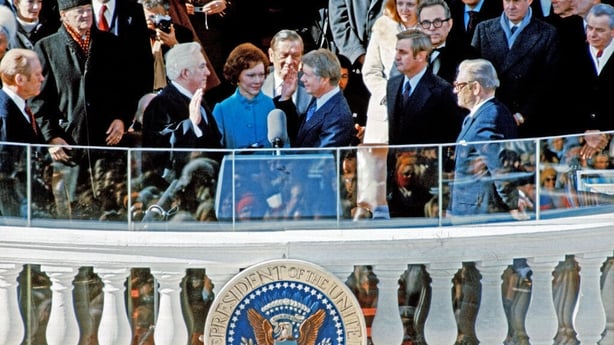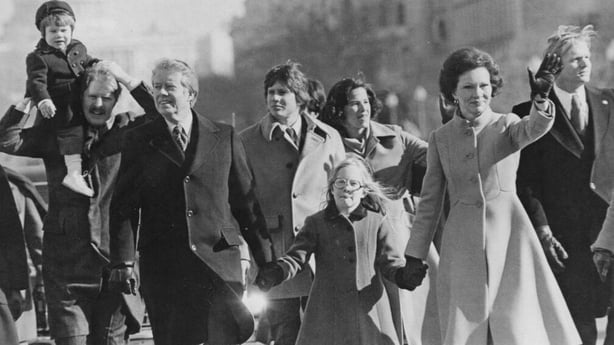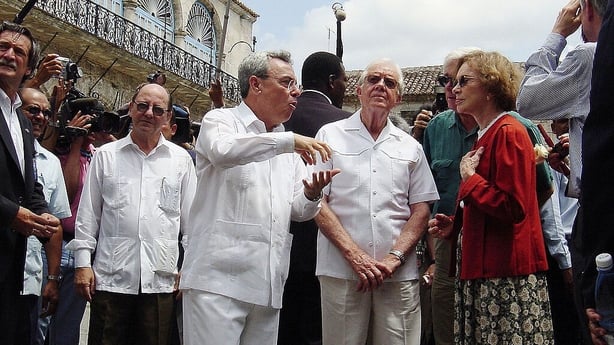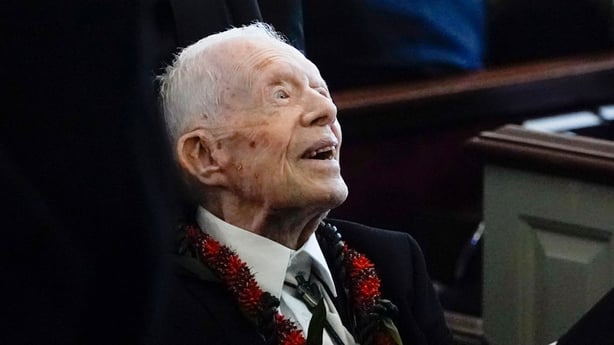"I have one life and one chance to make it count for something... My faith demands that I do whatever I can, wherever I am, whenever I can, for as long as I can with whatever I have to try to make a difference." - Jimmy Carter.
Jimmy Carter's presidency may have been short lived and dominated by high profile crises, but he will go down in American presidential history as one who profoundly dedicated his time and life to human rights.
Born in 1924, a peanut farm in Plains Georgia was home to the young Jimmy Carter.
A lieutenant submariner in the navy, he married Rosalyn Smith and took over the family farm in 1953.
A political path to the very top awaited. He soon started to climb the ladder as an activist within the Democratic party.
As Georgia's governor, he beat incumbent Republican President Gerald Ford to become the 39th President of the United States in 1977.
"To be true to ourselves, we must be true to others" said Jimmy Carter at his inaugural address.

Although Carter served in the navy himself, he pardoned Vietnam draft-dodgers during his first days in office.
President Carter was hailed for appointing record numbers of women, African Americans, and Hispanics to government jobs. About one third of the 260 judges Mr Carter nominated during his term in office were women or from minority groups.
He established diplomatic relations with China and in 1978 brought old enemies - Egypt and Israel - together in a landmark Camp David agreement.
Read more: Former US president Jimmy Carter dies aged 100
A nuclear limitation treaty with the Soviet Union was also agreed but suspended after the Soviet invasion of Afghanistan.
As Jimmy Carter’s presidency glowed on the international stage, it soon started to tank domestically.
Against the backdrop of inflation and the 1979 energy crisis, his presidency was plagued by a lack of communication skills, low approval ratings and an unwillingness to work with legislators on capitol hill.

Another blow came in 1980, when eight soldiers died in a failed bid to free 52 American hostages held in Iran.
Not long after losing his bid for re-election to Ronald Regan in 1980, the hostages were freed.
Many historians would consider President Cater ahead of his time due to an early focus on climate action and warning the nation about its impact 40 years ago.
The director of a recent documentary on Jimmy Carter, Will Pattiz, told the Guardian newspaper that 'he was a visionary leader, decades ahead of his time trying to pull the country toward renewable energy, climate solutions, social justice for women and minorities, equitable treatment for all nations of the world.’
Even after his presidency, he continued working in conflict mediation including appeals for peace in Northern Ireland.
"I place myself firmly on the side of those who seek peace and reject violence in Northern Ireland" said Jimmy Carter in 1977.
In 1982, he established ‘The Carter Center’, a non-profit organisation with a mission to wage peace, fight disease and build hope.
The former President became the first senior US political figure to visit Cuba in 2002 and never shied away from criticising his own country.

His devotion to human rights earned him the Nobel Peace Prize in 2002 for ‘undertaking peace negotiations, campaigning for human rights, and working for social welfare’.
"America did not invent human rights. In a very real sense… human rights invented America" he said in his presidential farewell address.
A year after his 90th birthday in 2015 he was diagnosed with cancer. Age and illness didn't stop him volunteering even after numerous falls during his final years.
More recently, he went viral after a photograph with the Bidens had an awkward perspective.
Jimmy Carter will be remembered as a diplomat, humanitarian and peacemaker.

As one American journalist, Michael Schaub put it: ‘His presidency was largely a failure, but he's the best ex-president the country's ever had’
Politics remained part of Jimmy Carter's life in his final months as he entered hospice care.
His grandson told the Democratic National Convention this year that he was looking forward to casting his ballot for Kamala Harris.
"Just recently, we were talking about his 100th birthday, and he said, 'Yeah, I'm excited about that, but I'm really excited to vote for Kamala Harris," Jason Carter told the DNC.
He is survived by his three sons and one daughter.







